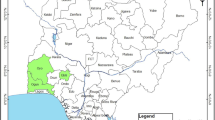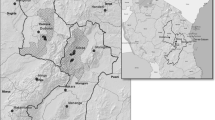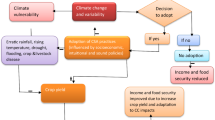Abstract
Climate change impacts on agriculture have substantial implications on human diet and nutrition. This study explored the factors affecting the adoption decisions of climate-smart agricultural practices through a multivariate probit model and then assessed the average effect of these adopted practices on rural households’ food diversity and per capita dietary intake by using propensity score matching. For this purpose, a total of 196 rural households from the Punjab province were selected through a multi-stage purposive and random sampling procedure for face to face survey. According to research results, the family type was found positively associated with the adoption of all climate-smart agricultural practices. More than 50% of the total daily per capita calorie and iron consumption of rural households is provided by the cereal crops. The Simpson food diversity index indicates that rural households adopting a higher number of practices consume more diversified food as compared to rural households with a lower number of practices at their farm. Moreover, the difference between the per capita calorie intake of full adopters and multiple adopters is the lowest as compared to the difference between full adopters and partial adopters and the difference between full adopters and single adopters. Thus, adopting more climate-smart agricultural practices increase calorie intake more than adopting fewer practices at the farm. Given a positive association between the level of adoption and food diversity as well as nutritional outcomes, government agencies should create awareness among the rural community about the benefits of adopting more climate-smart agricultural practices through visiting fields and organizing regular training for better nutrition.




Similar content being viewed by others
Data availability
Not applicable to this study.
References
Abbas, Q., Han, J., Adeel, A., & Ullah, R. (2019). Dairy production under climatic risks: Perception, perceived impacts and adaptations in Punjab, Pakistan. International Journal of Environmental Research and Public Health, 16(20), 4036. https://doi.org/10.3390/ijerph16204036.
Abegunde, V. O., Sibanda, M., & Obi, A. (2020). Determinants of the adoption of climate-smart agricultural practices by small-scale farming households in king Cetshwayo District municipality, South Africa. Sustainability, 12(1), 195. https://doi.org/10.3390/su12010195.
Abid, M., Scheffran, J., Schneider, U. A., & Ashfaq, M. (2015). Farmers' perceptions and adaptation strategies to climate change and their determinants: The case of Punjab province. Pakistan. Earth Syst. Dyn, 6(1), 225–243. https://doi.org/10.5194/esd-6-225-2015.
Abid, M., Schilling, J., Scheffran, J., & Zulfiqar, F. (2016). Climate change vulnerability, adaptation and risk perceptions at farm level in Punjab, Pakistan. Science of the Total Environment, 547, 447–460. https://doi.org/10.1016/j.scitotenv.2015.11.125.
Ahmad, A., Ahmad, I., Riaz Khan, M., Shah, S.H.H., Kamran, M.A., Wajid, S.A., Amin, M., Khan, A., Arshad, M.N., Cheema, M.J.M., Saqib, Z.A., Ullah, R., Ziaf, K., ul Huq, A., Ahmad, S., Fahad, M., Waqas, M.M., Abbas, A., Iqbal, A., (2019). Agro-ecological zones of Punjab, Pakistan – 2019. Rome, FAO. Accessed December 23, 2019 from http://www.fao.org/publications/card/en/c/CA6938EN.
Ahmad, M., Mustafa, G., & Iqbal, M. (2016). Impact of farm Households' adaptations to climate change on food security: Evidence from different agro-ecologies of Pakistan. The Pakistan Development Review, 55(4), 561–588. Retrieved February 21, 2020, from http://www.jstor.org/stable/44986004.
Ahmed A, Henna I, Chaudhry GM. (2008). Water resources and conservation strategy of Pakistan' paper presented in 23rd annual general meeting & conference of Pakistan Society of Development Economics, march 12–14, Pakistan Institute of Development Economics, (PIDE Islamabad).
Ali, A., & Erenstein, O. (2017). Assessing farmer use of climate change adaptation practices and impacts on food security and poverty in Pakistan. Climate Risk Management, 16, 183–194. https://doi.org/10.1016/j.crm.2016.12.001.
Amole, T. A., & Ayantunde, A. A. (2019). Options of making livestock production in West Africa “climate-smart”. All Africa conference on Animal Agriculture, Accra, Ghana, 29 July-2 August 2019.
Arimond, M., Wiesmann, D., Becquey, E., Carriquiry, A., Daniels, M. C., Deitchler, M., & Torheim, L. E. (2010). Simple food group diversity indicators predict micronutrient adequacy of women’s diets in 5 diverse, resource-poor settings. The Journal of Nutrition, 140(11), 2059S–2069S. https://doi.org/10.3945/jn.110.123414.
ASN, (2019). Nutrition and Climate Change, American Society for Nutrition. Accessed (December 1, 2020) from https://nutrition.org/nutrition-and-climate-change/ .
Belay, A., Recha, J. W., Woldeamanuel, T., & Morton, J. F. (2017). Smallholder farmers’ adaptation to climate change and determinants of their adaptation decisions in the central Rift Valley of Ethiopia. Agriculture & Food Security, 6(1), 24. https://doi.org/10.1186/s40066-017-0100-1.
Bryan, E., Ringler, C., Okoba, B., Roncoli, C., Silvestri, S., & Herrero, M. (2013). Adapting agriculture to climate change in Kenya: Household strategies and determinants. Journal of Environmental Management, 114, 26–35. https://doi.org/10.1016/j.jenvman.2012.10.036.
Conceição, P., Levine, S., Lipton, M., & Warren-Rodríguez, A. (2016). Toward a food secure future: Ensuring food security for sustainable human development in sub-Saharan Africa. Food Policy, 60, 1–9. https://doi.org/10.1016/j.foodpol.2016.02.003.
Crahay P. (2010). The Threats of Climate Change on Under-nutrition. A neglected issue that requires further analysis and urgent actions. In: United Nations Standing Committee on Nutrition (SCN), SCN News 38 2010: Climate change, food and nutrition security implications. SCN, Geneva.
Dehejia, R. H., & Wahba, S. (2002). Propensity score-matching methods for nonexperimental causal studies. The Review of Economics and Statistics, 84, 151e161–151e161. https://doi.org/10.1162/003465302317331982.
Deressa, T. T., Hassan, R. M., Ringler, C., Alemu, T., & Yesuf, M. (2009). Determinants of farmers’ choice of adaptation methods to climate change in the Nile Basin of Ethiopia. Global Environmental Change, 19, 248–255.
Ericksen, P., Ingram, J., & Liverman, D. (2009). Food security and global environmental change: Emerging challenges. Environmental Science & Policy, 12, 373–377. https://doi.org/10.1016/j.envsci.2009.04.007.
Fanzo, J., Davis, C., McLaren, R., & Choufani, J. (2018). The effect of climate change across food systems: Implications for nutrition outcomes. Global Food Security, 18, 12–19. https://doi.org/10.1016/j.gfs.2018.06.001.
FAO and GoP, (2001). Pakistan Dietary Guidelines for Better Nutrition. Accessed December 14, 2019 from http://www.fao.org/fileadmin/templates/food_composition/documents/regional/Book_Food_Composition_Table_for_Pakistan_.pdf
FAO and GoP, 2018. Pakistan Dietary Guidelines for Better Nutrition. Accessed December 10, 2019 from http://www.fao.org/3/ca1868en/CA1868EN.pdf
FAO (2020). Climate smart agriculture. Accessed on December 22,2020 from http://www.fao.org/climate-smart-agriculture/overview/en/ .
Gbetibouo, G. A. (2009). Understanding farmers’ perceptions and adaptations to climate change and variability: The case of the Limpopo Basin. South Africa: Intl Food Policy Res Inst.
Godfray, H. C. J., & Garnett, T. (2014). Food security and sustainable intensification. Philos. Trans. Biol. Sci., 369, 20120273. https://doi.org/10.1098/rstb.2012.0273.
Government of Pakistan (2016). Chapter 11: Health and nutrition, Pakistan economic survey, 2015–16. Ministry of Finance, Government of Pakistan, Islamabad. Accessed December 20, 2019 from http://www.finance.gov.pk/survey/chapters_16/11_Health.pdf
Government of Pakistan, 2019. Economic survey of Pakistan finance division, economic advisor‟s wing, Government of Pakistan, Islamabad. Accessed November 11, 2019 from http://www.finance.gov.pk/survey/chapters_19/Overview%20of%20the%20Economy.pdf
Hijioka Y. et al. (2014). Climate change 2014: Impacts, adaptation, and vulnerability - Asia. Cambridge, United Kingdom, and New York, USA: Cambridge University press. p. 1350.
Hussain, S. S., & Mudasser, M. (2007). Prospects for wheat production under changing climate in mountain areas of Pakistan–an econometric analysis. Agricultural Systems, 94, 494–501. https://doi.org/10.1016/j.agsy.2006.12.001.
Issahaku, G., & Abdulai, A. (2020). Can farm households improve food and nutrition security through adoption of climate-smart practices? Empirical evidence from northern Ghana. Applied Economic Perspectives and Policy, 42(3), 559–579. https://doi.org/10.1093/aepp/ppz002.
Javed, S.A., Kishwar, S., Iqbal, M., 2015. From perceptions to adaptation to climate change: Farm level evidence from Pakistan. Pakistan Institute of Development Economics, Islamabad, Pakistan.
Jomova, K., & Valko, M. (2011). Importance of iron chelation in free radical-induced oxidative stress and human disease. Current Pharmaceutical Design, 17(31), 3460–3473. https://doi.org/10.2174/138161211798072463.
Kanter, R., Walls, H. L., Tak, M., Roberts, F., & Waage, J. (2015). A conceptual framework for understanding the impacts of agriculture and food system policies on nutrition and health. Food Security, 7(4), 767–777. https://doi.org/10.1007/s12571-015-0473-6.
Kassie, G. T., Abdulai, A., Greene, W. H., Shiferaw, B., Abate, T., Tarekegne, A., & Sutcliffe, C. (2017). Modeling preference and willingness to pay for drought tolerance (DT) in maize in rural Zimbabwe. World Development, 94, 465–477. https://doi.org/10.1016/j.worlddev.2017.02.008.
Kreft, S., Eckstein, D., & Melchior, I. (2016). Global climate risk index 2017: Who suffers most from extreme weather events? Weather-related loss events in 2015 and 1996 to 2015. Germanwatch Nord-Süd Initiative eV.
Lee, W. S. (2013). Propensity score matching and variations on the balancing test. Empirical Economics, 44, 47e80–47e80. https://doi.org/10.1007/s00181-011-0481-0.
Liu, T., Bruins, R. J., & Heberling, M. T. (2018). Factors influenceng farmers’ adoption of best management practices: A review and synthesis. Sustainability, 10(2), 432. https://doi.org/10.3390/su10020432.
Lobell, D. B., Burke, M. B., Tebaldi, C., Mastrandrea, M. D., Falcon, W. P., & Naylor, R. L. (2008). Prioritizing climate change adaptation needs for food security in 2030. Science, 80–319. https://doi.org/10.1126/science.1152339.
Long, T. B., Blok, V., & Coninx, I. (2016). Barriers to the adoption and diffusion of technological innovations for climate-smart agriculture in Europe: Evidence from the Netherlands, France, Switzerland and Italy. Journal of Cleaner Production, 112, 9–21. https://doi.org/10.1016/j.jclepro.2015.06.044.
Makate, C., Wang, R., Makate, M., & Mango, N. (2016). Crop diversification and livelihoods of smallholder farmers in Zimbabwe: Adaptive management for environmental change. Springer Plus. DOI: https://doi.org/10.1186/s40064-016-2802-4. 5, 1135
Malapit, H. J. L., & Quisumbing, A. R. (2015). What dimensions of Women’s empowerment in agriculture matter for nutrition in Ghana? Food Policy, 52, 54–63. https://doi.org/10.1016/j.foodpol.2015.02.003.
Mango, N., Makate, C., Tamene, L., Mponela, P., & Ndengu, G. (2018). Adoption of small-scale irrigation farming as a climate-smart agriculture practice and its influence on household income in the Chinyanja triangle, southern Africa. Land, 7(2), 49. https://doi.org/10.3390/land7020049.
Menhas, R., Shumaila, U. M. E. R., & Shabbir, G. (2016). Climate change and its impact on food and nutrition security in Pakistan. Iranian Journal of Public Health, 45(4), 549–550.
Mertz, O., Halsnæs, K., Olesen, J. E., & Rasmussen, K. (2009). Adaptation to climate change in developing countries. Environmental Management, 43(5), 743–752. https://doi.org/10.1007/s00267-008-9259-3.
Morton, J. F. (2007). The impact of climate change on smallholder and subsistence agriculture. Proceedings of the National Academy of Sciences, 104(50), 19680–19685. https://doi.org/10.1073/pnas.0701855104.
Moursi, M. M., Arimond, M., Dewey, K. G., Trèche, S., Ruel, M. T., & Delpeuch, F. (2008). Dietary diversity is a good predictor of the micronutrient density of the diet of 6-to 23-month-old children in Madagascar. The Journal of Nutrition, 138(12), 2448–2453. https://doi.org/10.3945/jn.108.093971.
Muddassir, M., Jalip, M. W., Noor, M. A., Zia, M. A., Aldosri, F. O., Fiaz, S., et al. (2016). Farmers’ perception of factors hampering maize yield in rain-fed region of Pind Dadan Khan, Pakistan. Journal of Agricultural Extension, 20(2), 1–15.
Nabikolo, D., Bashaasha, B., Mangheni, M., & Majaliwa, J. (2012). Determinants of climate change adaptation among male and female headed farm households in eastern Uganda. African Crop Science Journal, 20, 203–212.
Negin, J., Remans, R., Karuti, S., & Fanzo, J. C. (2009). Integrating a broader notion of food security and gender empowerment into the African green revolution. Food Security, 1, 351–360. https://doi.org/10.1007/s12571-009-0025-z.
Nguyen, M. C., & Winters, P. (2011). The impact of migration on food consumption patterns: The case of Vietnam. Food Policy, 36(71), 87–87. https://doi.org/10.1016/j.foodpol.2010.11.001.
Nhemachena, C., Nhem, R., (2007). Micro-level analysis of farmers’ adaption to climate change in southern Africa. Intl. Food Policy Res. Inst.
Pakistan Bureau of statistics, (2010). Agricultural Census 2010 - Pakistan Report. Accessed January 20, 2020 from http://www.pbs.gov.pk/sites/default/files/aco/publications/agricultural_census2010/table01h.pdf
Pasha, H.A.(2015) Growth of the provincial economies. Institute for Policy Reforms (IPR). 2015. Accessed January 06, 2020. http://ipr.org.pk/wp-content/uploads/2016/04/GROWTH-OF-PROVINCIAL-ECONOMICS-.Pdf
Rahman, S. (2010). Women’s labor contribution to productivity and efficiency in agriculture: Empirical evidence from Bangladesh. Journal of Agricultural Economics, 61(2), 318–342. https://doi.org/10.1111/j.1477-9552.2010.00243.x.
Ribot, J. (2014). Cause and response: Vulnerability and climate in the Anthropocene. Journal of Peasant Studies, 41, 667–705. https://doi.org/10.1080/03066150.2014.894911.
Rosenbaum, P. R. (2007). Sensitivity analysis for m-estimates, tests, and confidence intervals in matched observational studies. Biometrics, 63, 456e464–456e464. https://doi.org/10.1111/j.1541-0420.2006.00717.x.
Ruel, M. T. (2003). Operationalizing dietary diversity: A review of measurement issues and research priorities. Journal of Nutrition, 133, 3911S–3926S. https://doi.org/10.1093/jn/133.11.3911S.
Shahbaz, P., Boz, I., & Haq, S. U. (2017). Determinants of crop diversification in mixed cropping zone of Punjab Pakistan. Direct Research Journal Agricultural Food Science, 5(11), 360–366.
Shahbaz, P., Boz, I., & Ul, H. S. (2020 May). Adaptation options for small livestock farmers having large ruminants (cattle and buffalo) against climate change in Central Punjab Pakistan. Environmental Science and Pollution Research, 27(15), 17935–17948. https://doi.org/10.1007/s11356-020-08112-9.
Smit, B., & Skinner, M. W. (2002). Adaptation options in agriculture to climate change: A typology. Mitig. Adapt. Strat. Glob. Change, 7, 85–114.
Taneja, G., Pal, B. D., Joshi, P. K., Aggarwal, P. K., & Tyagi, N. K. (2019). Farmers’ preferences for climate-smart agriculture—An assessment in the indo-Gangetic plain. In climate smart agriculture in South Asia (pp. 91–111). Springer, Singapore. https://doi.org/10.1023/A:1015862228270, Adaptation options in agriculture to climate change: a typology.
Taylor, J. E., Rozelle, S., & De Brauw, A. (2003). Migration and incomes in source communities: A new economics of migration perspective from China. Economic Development and Cultural Change, 52(1), 75–101.
Teklewold, H., Gebrehiwot, T., & Bezabih, M. (2019). Climate smart agricultural practices and gender differentiated nutrition outcome: An empirical evidence from Ethiopia. World Development, 122, 38–53. https://doi.org/10.1016/j.worlddev.2019.05.010.
Tiwari, V., Wahr, J., & Swenson, S. (2009). Dwindling groundwater resources in northern India, from satellite gravity observations. Geophysical Research Letters, 36. https://doi.org/10.1029/2009GL039401.
UNDP, 2019. Climate change adaptation Pakistan. Accessed December 1, 2019 form https://www.adaptation-undp.org/explore/pakistan .
Yila, J. O., & Resurreccion, B. P. (2013). Determinants of smallholder farmers’ adaptation strategies to climate change in the semi arid Nguru local government area, northeastern Nigeria. Management of Environmental Quality. An international journal, 24(3), 341–364.
Author information
Authors and Affiliations
Corresponding author
Ethics declarations
Conflict of interest
The authors declare that there is no conflict of interest.
Additional information
Manuscript submission
I/We confirm that this work is original and has not been published elsewhere nor is it currently under consideration for publication elsewhere.
Rights and permissions
About this article
Cite this article
Haq, S., Boz, I. & Shahbaz, P. Adoption of climate-smart agriculture practices and differentiated nutritional outcome among rural households: a case of Punjab province, Pakistan. Food Sec. 13, 913–931 (2021). https://doi.org/10.1007/s12571-021-01161-z
Received:
Accepted:
Published:
Issue Date:
DOI: https://doi.org/10.1007/s12571-021-01161-z






